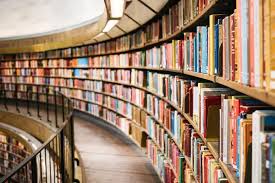This is one of those small miracles of democracy,
“In the library,” Crosby Kemper said, “everyone is equal.”
The concept is wondrously simple: You find books and take them home. “Riches that were not ordinarily available to the common man” are there for anyone, Abby Van Slyck said.
Kemper (a librarian) and Van Slyck (a historian) are among the people in a compelling documentary. “Free For All: The Public Library” airs at 10 p.m. Tuesday (April 29) on PBS, under the “Independent Lens” banner.
The film spans a full range – from literary cathedrals in big cities to cozy nooks in small towns. It views the obstacles – segregation, tax revolts, book-banning – and darkens two library heroes: Melvil Dewey (of decimal-system fame) and Andrew Carnegie, who funded 1,689 libraries.
But alongside that are waves of joy. “I’m throwing a party every day,” says Elizabeth Timmins, the librarian in Seymour, a Wisconsin town of 3,500. One of her visitors age 9, says he’s “an ordinary, typical kid who comes to the library every day.”
This vast canvas encases the experience of Dawn Logsdon, the film’s co-writer and co-director.
Her dad, she says in the film, was a city kid with Slovak roots, who used the library to “escape violence in the city streets.”
Her mom, by comparison, was from rural Wisconsin, a region that might have been bookless … except for one enterprising librarian.
The two married and worked as teachers in New Orleans. The family would load up the car and take long summer vacations; at each camping stop, they got temporary library cards.
And when a huge storm barreled down on New Orleans? Most families rushed to the basement; hers rushed to the library and then the basement.
So Logsdon offers a good perspective on libraries from the view of cities, small towns, the South, women and more.
Cities? At Ernestine Rose’s first library job in New York, she began adapting to the needs of her Russian Jewish neighbors. She was then put in charge of the Harlem library and hired the city’s first four Black librarians.
One took the lead in buying a mega-collection of African-American books and art. Another started a basement theater where Harry Belafonte and Sidney Poitier did their first work.
Small towns? The film points to Lutie Stearns, who said: “Isolation is the scourge of rural life.”
Others had realized that previously. (Abraham Lincoln’s life transformed when his new step-mother arrived, with a large load of books.)
But Stearns did something about it. She led a statewide effort and was called “the Johnny Appleseed of books.”
Stearns took books to 1,500 spots around Wisconsin. She helped create a 30-county library system and helped launch 150 library buildings.
The South? Annie McPheeters’ family went to the opening of the library in Rome, Ga., only to be banned because it was whites-only.
She became a librarian, assembled a “Negro history” collection in an Atlanta library and savored her regular visitors. One was young Martin Luther King; each time, he would recite the start of a poem, to see if she could finish it.
And women? In some ways, Dewey was a hero. He created the first librarian college and – despite objections – insisted that it include women. The student body was overwhelmingly female (17 of 20 in the first class) and was one step in transforming a male-dominated field.
Still, the film points out that Dewey had limited scope. Most of his students were white, middle-class and unmarried; later, he lost all of his library positions, due to charges of frequent sexual harassment.
Another library hero also gets a mixed portrait.
Andrew Carnegie, the film says, brutalized his workers (with low pay for six-day weeks) and their unions. He made a fortune — then donated it to build 1,689 libraries around the country.
A few are gone now, but many libraries (Carnegie or not) are vibrant.
The film shows visitors ranging from an elderly man (“there are a lot of people for whom books are all they have,” one librarian says) to a mom with her 13 home-schooled children, all of them eager at the library.
It also shows people playing chess, hearing stories, taking classes, exercising, trying computers, hearing music, watching dance and more. It’s big and varied and free for all.

In tiny towns and big cities, libraries thrive
This is one of those small miracles of democracy,
“In the library,” Crosby Kemper said, “everyone is equal.”
The concept is wondrously simple: You find books and take them home. “Riches that were not ordinarily available to the common man” are there for anyone, Abby Van Slyck said.
Kemper (a librarian) and Van Slyck (a historian) are among the people in a compelling documentary. “Free For All: The Public Library” airs at 10 p.m. Tuesday (April 29) on PBS, under the “Independent Lens” banner Read more…